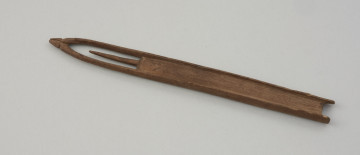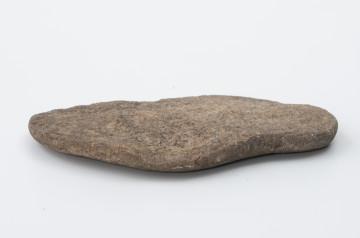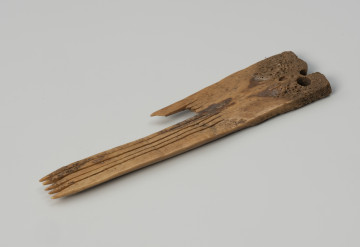
Ticker
1176 — 1225
National Museum in Szczecin
Part of the collection: Middle Ages
One of the main economic activities of the inhabitants of early-medieval Kamień was fishing – with nets and fishing poles. We can find out a lot about fishing techniques by analysing artefacts found during excavations, including numerous fishing net floats, usually made of the bark of trees such as pine, oak, poplar or birch. The float from Kamień Pomorski was made from a piece of pine bark. It has an elongated, oval shape with one end rounded and the other cut to shape – both sides feature pairs of oval holes drilled with the tip of a knife or an auger, which were used for threading cords, which were then tied to the top of the net. Floats were used to keep the net afloat and also made it easier to find the net on the water. Archaeological finds dating back to the early Middle Ages feature floats in various shapes and forms – trapezoidal, round, and elongated. In some cases specific marks can be found on their surfaces – denoting ownership of a particular net. These usually comprise straight or diagonal lines, as well as geometric shapes. These marks were often inherited within families. In some cases, the heir who inherited the mark made minor changes by adding new lines or dots to the old design. These days, lake and river fishermen use barrel-shaped floats made of plastic, as well as ordinary plastic bottles. Some of them contain cards with basic details of the person authorised to fish in the area.
Grzegorz Durdyń
Author / creator
Dimensions
cały obiekt: height: 21.6 cm, width: 7 cm
Object type
fishing net buoy, fishing equipment
Technique
drilling, planing
Material
bark
Origin / acquisition method
field research
Creation time / dating
Creation / finding place
Owner
Muzeum Narodowe w Szczecinie
Identification number
Location / status

1176 — 1225
National Museum in Szczecin

801 — 1201
National Museum in Szczecin

1176 — 1200
National Museum in Szczecin
DISCOVER this TOPIC
National Museum in Lublin
DISCOVER this PATH
Educational path